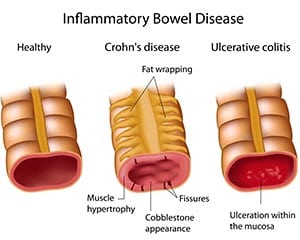Inflammatory Bowel Disease (IBD) is a term that is used to describe two chronic diseases: Ulcerative Colitis and Crohn’s Disease. IBD can cause diarrhea, abdominal pain, rectal bleeding and inflammation in the intestines, affecting as many as 3.1 million Americans, many who are diagnosed before age 35. The cause of IBD remains unknown and IBD affects men and women equally.

The board-certified physicians at Suburban Gastroenterology possess the expertise and proficiency to effectively treat a wide range of conditions. Whether you require diagnosis, treatment, or ongoing care, our specialists are committed to not only addressing your disorder but also supporting you in achieving a better quality of life. Please click on the links below to learn more on ulcerative colitis and Crohn’s disease.


